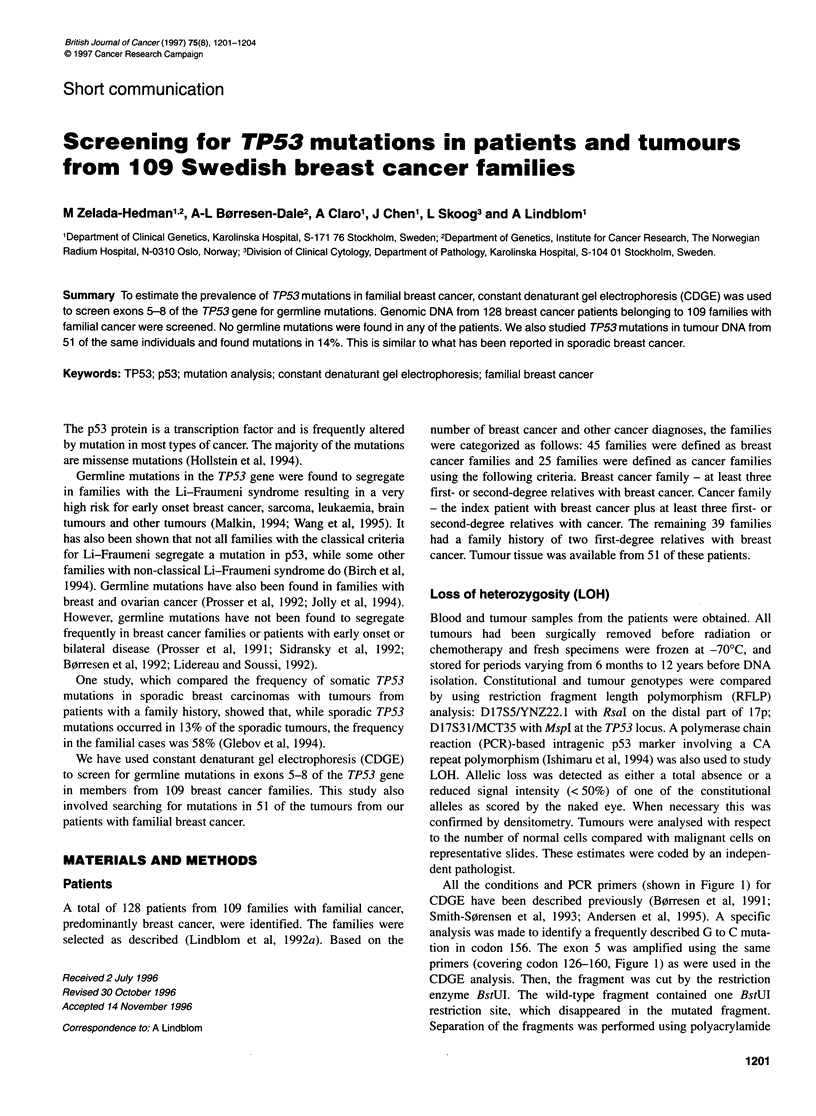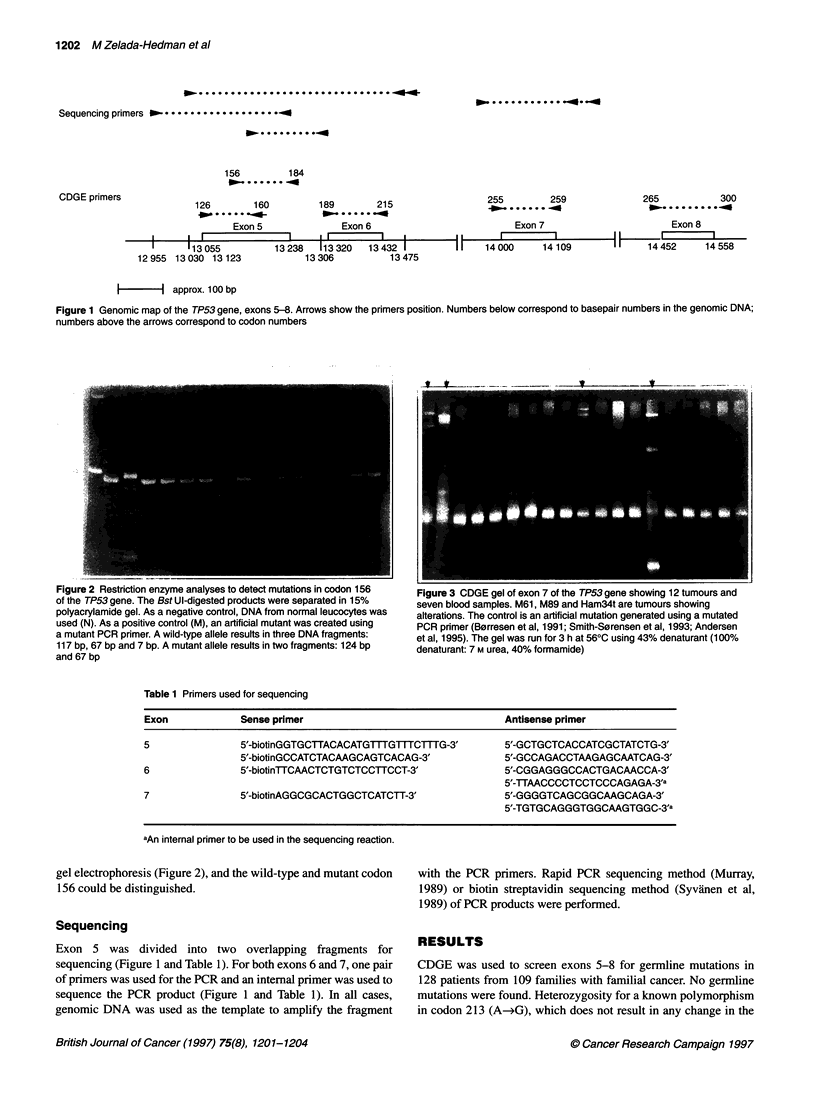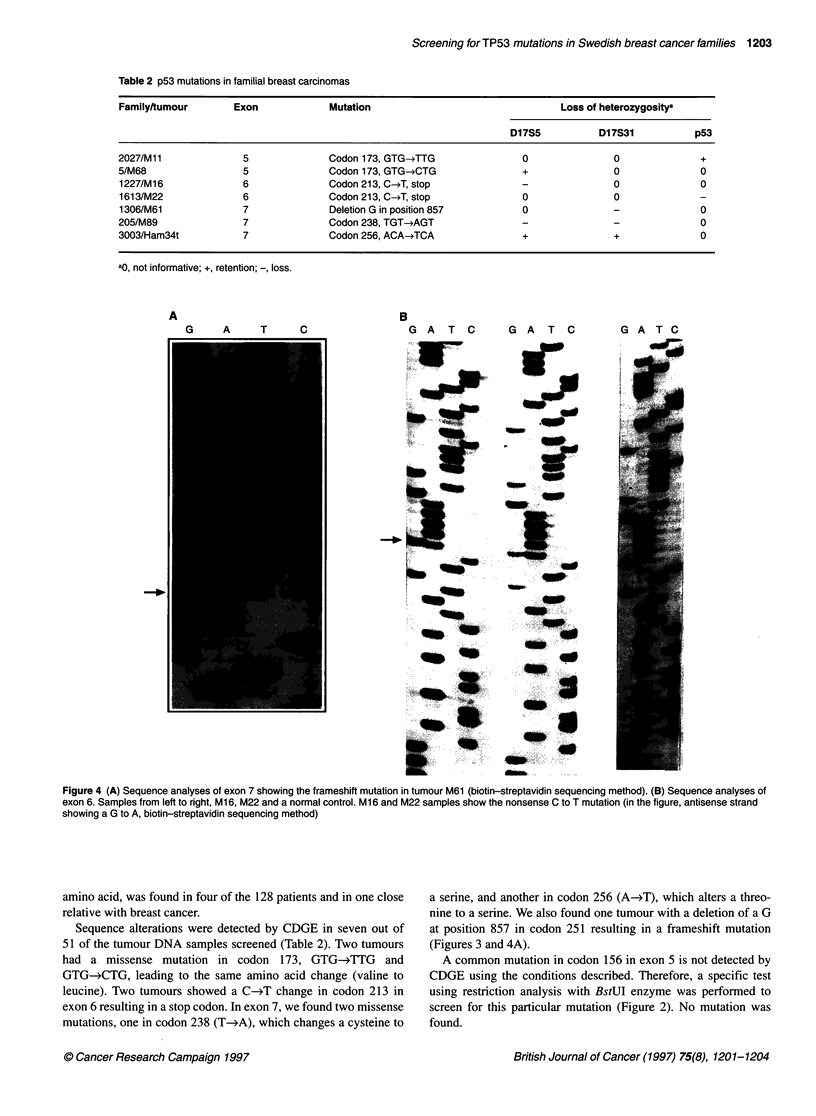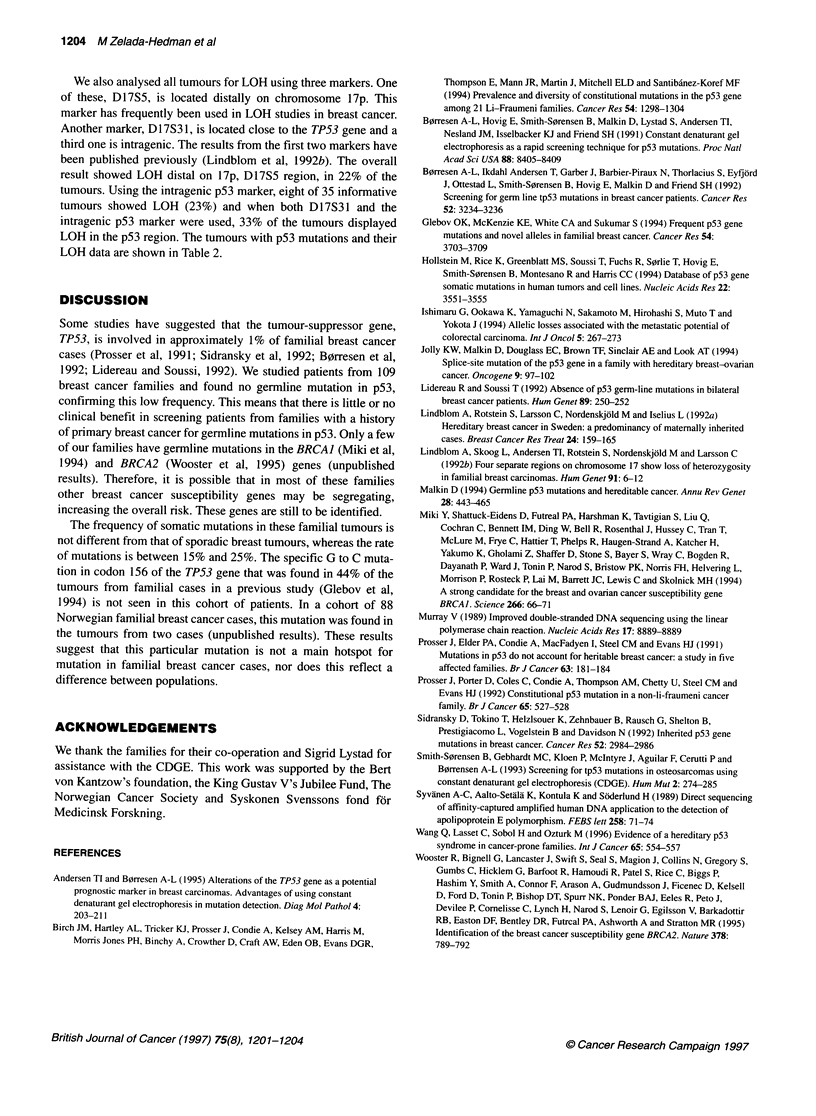Abstract
To estimate the prevalence of TP53 mutations in familial breast cancer, constant denaturant gel electrophoresis (CDGE) was used to screen exons 5-8 of the TP53 gene for germline mutations. Genomic DNA from 128 breast cancer patients belonging to 109 families with familial cancer were screened. No germline mutations were found in any of the patients. We also studied TP53 mutations in tumour DNA from 51 of the same individuals and found mutations in 14%. This is similar to what has been reported in sporadic breast cancer.
Full text
PDF



Images in this article
Selected References
These references are in PubMed. This may not be the complete list of references from this article.
- Andersen T. I., Børresen A. L. Alterations of the TP53 gene as a potential prognostic marker in breast carcinomas. Advantages of using constant denaturant gel electrophoresis in mutation detection. Diagn Mol Pathol. 1995 Sep;4(3):203–211. doi: 10.1097/00019606-199509000-00008. [DOI] [PubMed] [Google Scholar]
- Birch J. M., Hartley A. L., Tricker K. J., Prosser J., Condie A., Kelsey A. M., Harris M., Jones P. H., Binchy A., Crowther D. Prevalence and diversity of constitutional mutations in the p53 gene among 21 Li-Fraumeni families. Cancer Res. 1994 Mar 1;54(5):1298–1304. [PubMed] [Google Scholar]
- Børresen A. L., Andersen T. I., Garber J., Barbier-Piraux N., Thorlacius S., Eyfjörd J., Ottestad L., Smith-Sørensen B., Hovig E., Malkin D. Screening for germ line TP53 mutations in breast cancer patients. Cancer Res. 1992 Jun 1;52(11):3234–3236. [PubMed] [Google Scholar]
- Børresen A. L., Hovig E., Smith-Sørensen B., Malkin D., Lystad S., Andersen T. I., Nesland J. M., Isselbacher K. J., Friend S. H. Constant denaturant gel electrophoresis as a rapid screening technique for p53 mutations. Proc Natl Acad Sci U S A. 1991 Oct 1;88(19):8405–8409. doi: 10.1073/pnas.88.19.8405. [DOI] [PMC free article] [PubMed] [Google Scholar]
- Glebov O. K., McKenzie K. E., White C. A., Sukumar S. Frequent p53 gene mutations and novel alleles in familial breast cancer. Cancer Res. 1994 Jul 15;54(14):3703–3709. [PubMed] [Google Scholar]
- Hollstein M., Rice K., Greenblatt M. S., Soussi T., Fuchs R., Sørlie T., Hovig E., Smith-Sørensen B., Montesano R., Harris C. C. Database of p53 gene somatic mutations in human tumors and cell lines. Nucleic Acids Res. 1994 Sep;22(17):3551–3555. [PMC free article] [PubMed] [Google Scholar]
- Jolly K. W., Malkin D., Douglass E. C., Brown T. F., Sinclair A. E., Look A. T. Splice-site mutation of the p53 gene in a family with hereditary breast-ovarian cancer. Oncogene. 1994 Jan;9(1):97–102. [PubMed] [Google Scholar]
- Lidereau R., Soussi T. Absence of p53 germ-line mutations in bilateral breast cancer patients. Hum Genet. 1992 May;89(2):250–252. doi: 10.1007/BF00217135. [DOI] [PubMed] [Google Scholar]
- Lindblom A., Rotstein S., Larsson C., Nordenskjöld M., Iselius L. Hereditary breast cancer in Sweden: a predominance of maternally inherited cases. Breast Cancer Res Treat. 1992;24(2):159–165. doi: 10.1007/BF01961248. [DOI] [PubMed] [Google Scholar]
- Lindblom A., Skoog L., Andersen T. I., Rotstein S., Nordenskjöld M., Larsson C. Four separate regions on chromosome 17 show loss of heterozygosity in familial breast carcinomas. Hum Genet. 1993 Mar;91(1):6–12. doi: 10.1007/BF00230213. [DOI] [PubMed] [Google Scholar]
- Malkin D. Germline p53 mutations and heritable cancer. Annu Rev Genet. 1994;28:443–465. doi: 10.1146/annurev.ge.28.120194.002303. [DOI] [PubMed] [Google Scholar]
- Miki Y., Swensen J., Shattuck-Eidens D., Futreal P. A., Harshman K., Tavtigian S., Liu Q., Cochran C., Bennett L. M., Ding W. A strong candidate for the breast and ovarian cancer susceptibility gene BRCA1. Science. 1994 Oct 7;266(5182):66–71. doi: 10.1126/science.7545954. [DOI] [PubMed] [Google Scholar]
- Murray V. Improved double-stranded DNA sequencing using the linear polymerase chain reaction. Nucleic Acids Res. 1989 Nov 11;17(21):8889–8889. doi: 10.1093/nar/17.21.8889. [DOI] [PMC free article] [PubMed] [Google Scholar]
- Prosser J., Elder P. A., Condie A., MacFadyen I., Steel C. M., Evans H. J. Mutations in p53 do not account for heritable breast cancer: a study in five affected families. Br J Cancer. 1991 Feb;63(2):181–184. doi: 10.1038/bjc.1991.44. [DOI] [PMC free article] [PubMed] [Google Scholar]
- Prosser J., Porter D., Coles C., Condie A., Thompson A. M., Chetty U., Steel C. M., Evans H. J. Constitutional p53 mutation in a non-Li-Fraumeni cancer family. Br J Cancer. 1992 Apr;65(4):527–528. doi: 10.1038/bjc.1992.109. [DOI] [PMC free article] [PubMed] [Google Scholar]
- Sidransky D., Tokino T., Helzlsouer K., Zehnbauer B., Rausch G., Shelton B., Prestigiacomo L., Vogelstein B., Davidson N. Inherited p53 gene mutations in breast cancer. Cancer Res. 1992 May 15;52(10):2984–2986. [PubMed] [Google Scholar]
- Smith-Sørensen B., Gebhardt M. C., Kloen P., McIntyre J., Aguilar F., Cerutti P., Børresen A. L. Screening for TP53 mutations in osteosarcomas using constant denaturant gel electrophoresis (CDGE). Hum Mutat. 1993;2(4):274–285. doi: 10.1002/humu.1380020407. [DOI] [PubMed] [Google Scholar]
- Syvänen A. C., Aalto-Setälä K., Kontula K., Söderlund H. Direct sequencing of affinity-captured amplified human DNA application to the detection of apolipoprotein E polymorphism. FEBS Lett. 1989 Nov 20;258(1):71–74. doi: 10.1016/0014-5793(89)81618-7. [DOI] [PubMed] [Google Scholar]
- Wang Q., Lasset C., Sobol H., Ozturk M. Evidence of a hereditary p53 syndrome in cancer-prone families. Int J Cancer. 1996 Feb 8;65(4):554–557. [PubMed] [Google Scholar]
- Wooster R., Bignell G., Lancaster J., Swift S., Seal S., Mangion J., Collins N., Gregory S., Gumbs C., Micklem G. Identification of the breast cancer susceptibility gene BRCA2. Nature. 1995 Dec 21;378(6559):789–792. doi: 10.1038/378789a0. [DOI] [PubMed] [Google Scholar]





